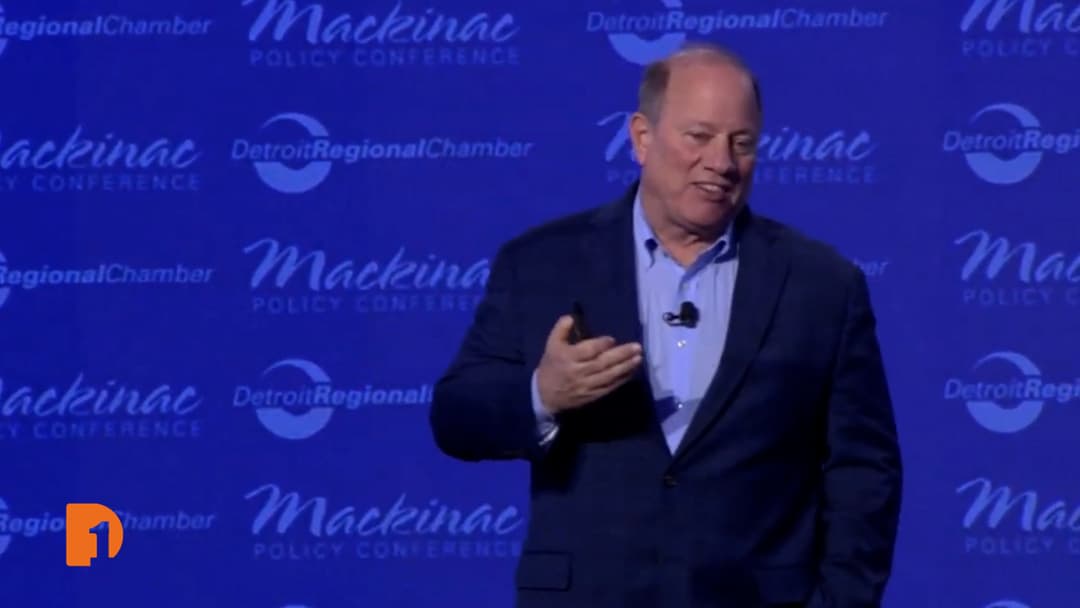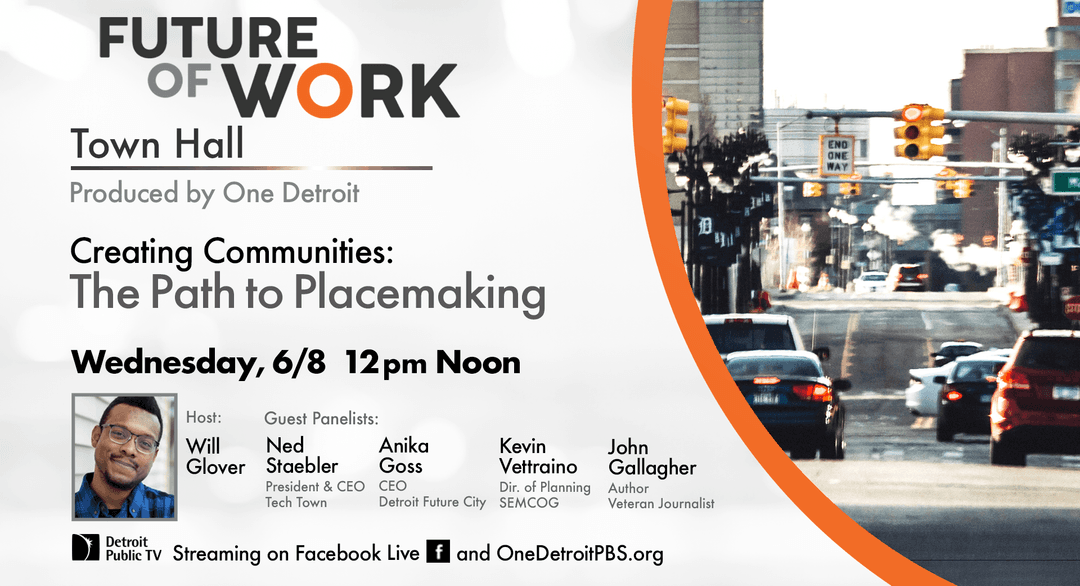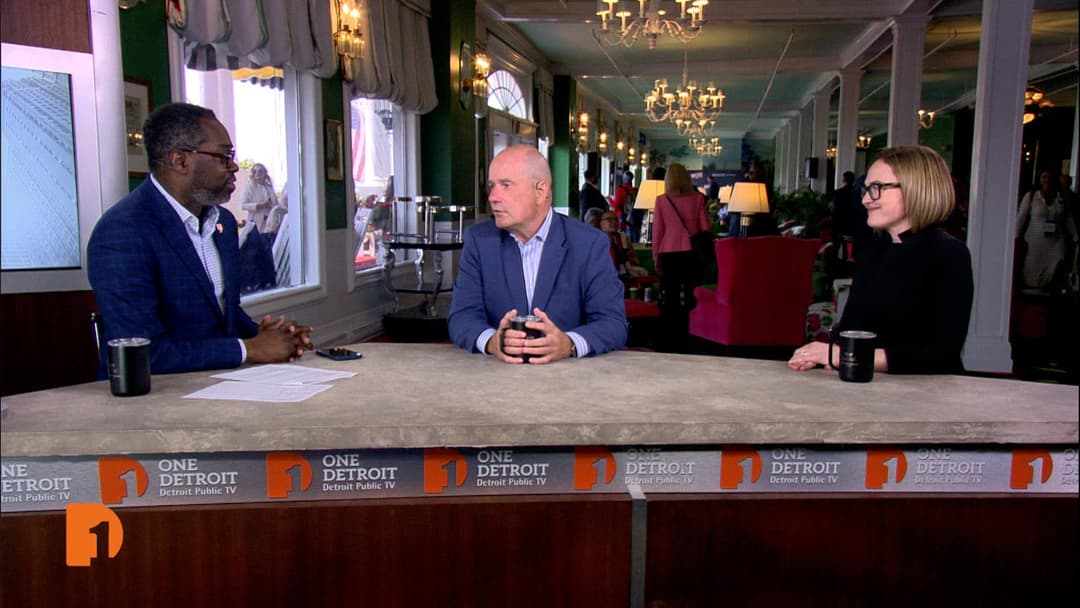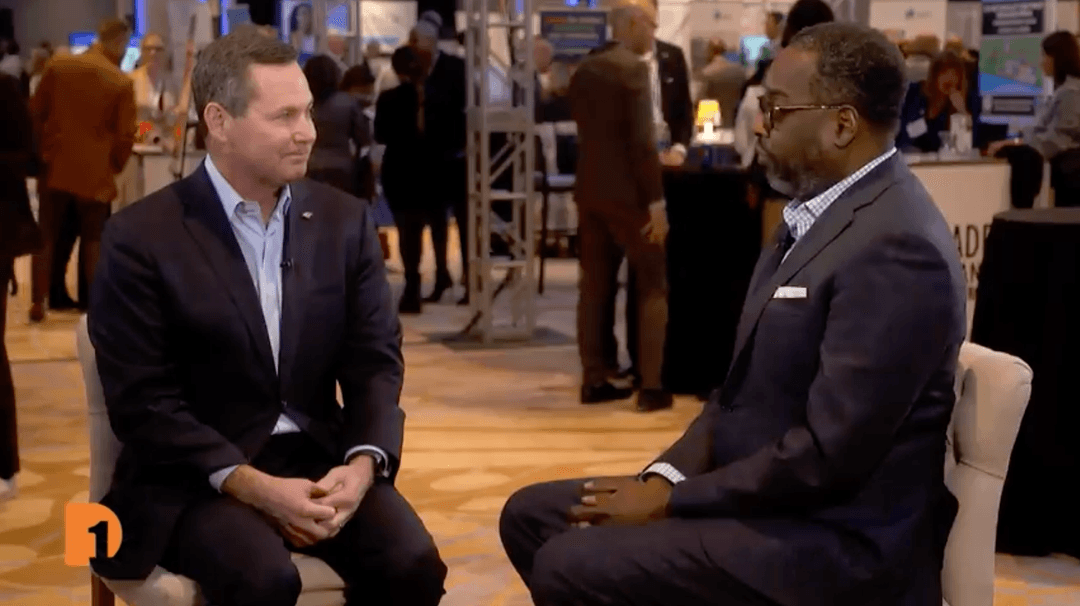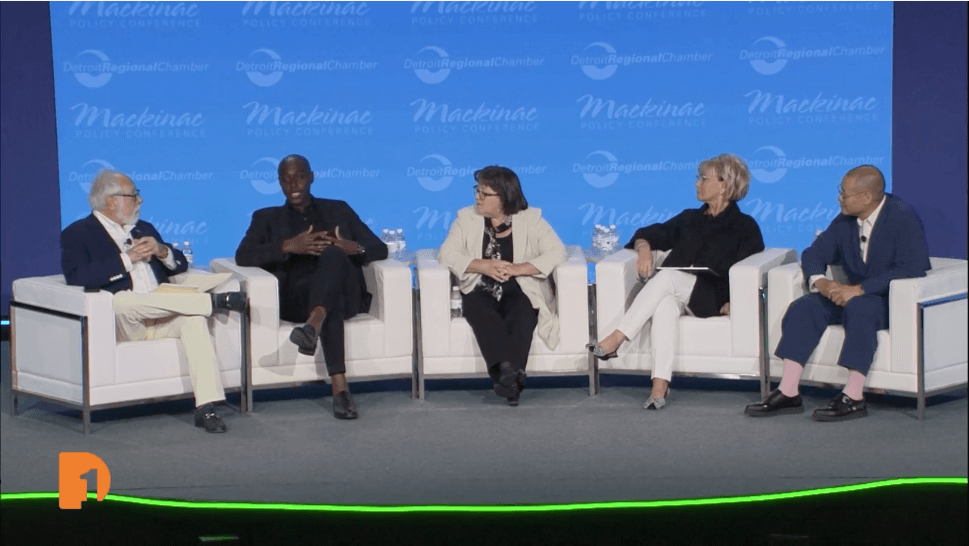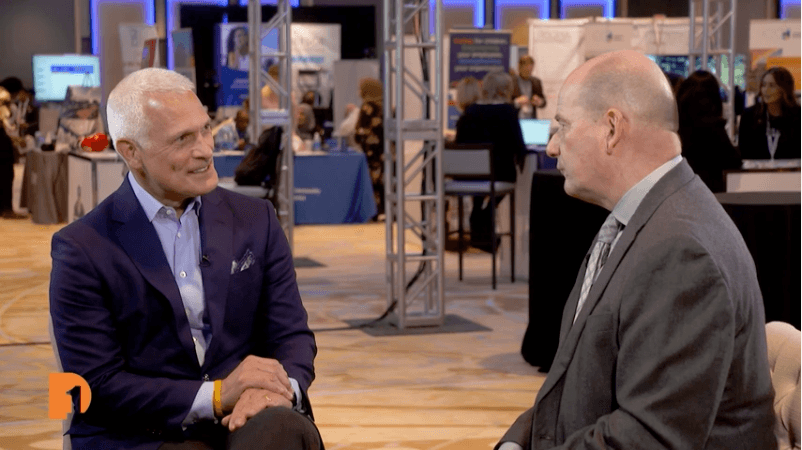Imagining Michigan’s future with Richard Florida and Zoe Clark
Jul 27, 2023
Thriving cities are essential to a state’s prosperity. A flourishing population with a robust talent pipeline helps shape a healthy economy, but Michigan’s population has been shrinking for decades, especially in its efforts to attract young, college-educated tech talent from elsewhere.
RELATED: Michigan business leaders say education, trained workforce key to making Michigan more competitive
A recent report released by the nonpartisan Citizens Research Council of Michigan found that Michigan has trailed behind other states in population growth for 50 years and this trajectory is projected to continue, if not worsen through 2050. On the heels of this grim news, Gov. Gretchen Whitmer announced the formation of a bipartisan, 28-member council to brainstorm strategies to solve the state’s lagging population problem at this year’s Mackinac Policy Conference.
At the conference, renowned urbanist Richard Florida, Founder of the Creative Class Group also introduced the findings of a new report done for the Detroit Regional Chamber. Florida’s report identifies and studies regions across North America that are successfully attracting high-tech talent and business, compares them to Michigan and provides recommendations on how the state can become more competitive.
RELATED: Richard Florida shares the two priorities downtown Detroit needs for its post-pandemic recovery
RELATED: Placemaking: The path to increasing quality of life, talent attraction in Michigan
One Detroit contributor Zoe Clark, political director for Michigan Radio, talks with Florida about the results from his study, “Michigan’s Great Inflection,” why Michigan’s population has fallen behind, placemaking, and how to ensure the state’s long-term prosperity.
Full Transcript:
Zoe Clark, One Detroit contributor, Michigan Radio Political Director: Hello and welcome One Detroit’s ongoing coverage of Michigan’s future. As most of us know, our state is in a national, really a global, competition for its slice of the economic pie and the jobs and quality of life that comes with that. Our state has a lot to be proud of. An Increasingly tech-savvy automotive industry, unmatched natural beauty, resurgent urban hubs, and great colleges and college towns. Yet for all of that, when compared to other states, Pure Michigan is population-poor.
A new report finds Michigan was second to last in population growth since 1990, behind only West Virginia. Hi, I’m Zoe Clark, political director at Michigan Radio. Recently, Governor Gretchen Whitmer spoke about our population problem at the Mackinac Policy Conference, and she announced the creation of a bipartisan commission to try and fix the problem. But how do we actually attract and retain people to fill new jobs, fuel the economy, and help write the next chapter of Michigan’s future?
Joining me today is someone with, if not all the answers, many of them. Richard Florida is one of the leading and most quoted urbanists. He is an author, professor, and the person who coined the term creative class for a cohort of knowledge workers, entrepreneurs, and others who drive economic development. I had an opportunity to speak to Richard at the Mackinac Policy Conference, and he’s been kind enough to join us today for an even longer conversation. Richard, it’s so good to see you again.
Richard Florida, Founder, Creative Class Group: It’s great to see you, Zoe. It’s been too long. It’s been over a month.
Zoe Clark: I was going to say, we can’t go this long. So, Richard, I love to pick your brain. And I want to start with just this eye-opening fact, this report that came out this spring that really sort of had the buzz of Mackinaw, that showed the dire state of Michigan’s population growth or lack thereof, really. When you hear of a state, any state, incapable of growing its population, what’s the first thing that comes to mind for you? Like, what is the problem?
Richard Florida: Well, it’s important news, but it’s not new news. I mean, I’ve been doing this for a while, and if you’ve been studying demographics and economic change, population growth and decline. One thing you know, if there’s one fact you know, it’s that the Sunbelt has been growing and the Frost Belt has been declining for a while. I don’t know if this is true anymore, but for most of the past four decades, housing has been a lot more affordable in the Sunbelt, and there’s been more economic growth.
Now, jobs weren’t those good-paying union factory jobs like you had in Michigan or Ohio, or Indiana. But jobs were growing, and the population was growing. I think maybe until very recently until we ended up with the highest days on record, people thought that a warm, sunny climate was better. So, yeah, I think Michigan has been caught up in an ongoing long-run shift in population away from the Frost Belt, the Great Lakes States, The Midwest, whatever word you want to use for that to the Sunbelt.
In fact, a very famous urban economist, Ed Glaeser at Harvard, actually wrote a whole economics paper showing that sun days and temperature were a big predictor of where the population was going. That said, I think if we’re lucky- I don’t want to make a prognostication. I don’t have my crystal ball handy. I think we may have been reaching a tipping point and the report captured hopefully what is the beginning of the end of this. And maybe we’re beginning to see yet another shift after COVID. Maybe, hopefully, we can abate this tremendous loss of population in Michigan and other Great Lakes states.
Zoe Clark And you, yourself, have a paper with some recommendations, and we’re going to get all into that, about how we could possibly go about fixing this. But let’s do some level setting first, like, why does it matter? There might be some folks who are like, okay, so the population is slowed, it means more space in Michigan. Help us understand why this is an important issue when we talk about population loss.
Richard Florida: Well, first, we have to say why it matters for me and why a guy from the University of Toronto who grew up in New Jersey is so concerned with Michigan… It’s because my wife is from Michigan and my kids, although we live in Toronto, all of their- I shouldn’t say all. My brother has three kids. They live in New Jersey, but most of their cousins live in Michigan.
In fact, Zoe, my brother’s daughter, who’s from New Jersey, who’s is going to the University of Michigan, to join five cousins on my wife’s side. I mean, it’s sort of amazing to me. I think we have eight or nine or ten nieces and nephews in college. More than half of them are at one university. So it matters to me. And why does it matter?
Well, your question is so interesting and so perceptive. I lived in Pittsburgh for nearly 20 years, and an argument was made when I was in Pittsburgh, not by me, but that actually shrinking population would be good for Pittsburgh. And folk, hold on to your seats. The argument was that Pittsburgh could be like Switzerland without mountain slopes. That what Switzerland did was become richer with fewer people.
Now, for most economists, and most demographers, there’s a little sliver of truth in that. But for most people, they believe, and I think the truth is when your population grows, you have people, economic assets, consumption, demand, I could go on, you are going to generally grow your economy. And I think what’s important for Michigan now- this sounds so weird. We have a labor shortage. Like, who would have thought that?
And I don’t want to say— there are still many good jobs we could create. But in general, when you take all the jobs and what’s coming now with reinvestment in manufacturing and electric vehicles and semiconductors, we’re going to have a real shortage of workforce. And so I think the idea would be that we need to add people so that we can get our economy jumpstarted and we can have the labor force that we need to meet this new demand.
Zoe Clark: Well, I think that is a great way of taking us to this line of this sentence from your report. “Michigan is at a historic inflection point.” Right? That’s where we find ourselves right now. And you sort of hear what you’re talking about, politics, this is the most historic election yet. You hear about decades, this is the most important decade yet. But you’re really saying it here, that right now, specifically for a state like Michigan, this is kind of make or break.
Richard Florida: It was really surprising to me. I began my- Well, my dad worked in a factory in Newark, New Jersey. My dad only had a seventh-grade education. He got a job making eyeglasses like yours and mine. I’m not kidding. I mean, they looked like this. And I watched deindustrialization happen. I watched… That was a huge eyeglass factory and the manufacturer- I watched the factory decline.
I watched my dad get put out of work. I lived in Pittsburgh. I watched the closing of the steel mills. I watched the catastrophe of the auto industry and heavy industry in Michigan. So I have a long history in this.
If you would have asked me five years ago, could this come back? I would have been maybe, hopefully, let’s pray. But what happened, I think, without the sort of behind-the-scenes, if you will, or certainly when I didn’t have my eyes on it, is the nature of the auto industry, this internal combustion engine analog thing driven by a driver with a shifter… It changed.
And it used to be that the trendy industries were computers and cell phones and digital devices in Silicon Valley and in Boston. All of a sudden, this thing we call the car is becoming something different. It’s driven by software, it’s assisted by artificial intelligence, it’s built by humans and by robotics. And it’s powered not by, necessarily, an internal combustion engine, but by an electric engine and a battery. Talk about a turning point.
And what I tried to grapple with in this report, I’ll sort of say it in shorthand for everyone listening in, in the past when we made these big technological shifts in our country or in the world or in regions… Metropolitan or city regions. When Boston lost its textile industry in the 1940s and fifties, it said, oh, we’re going to grow high-tech industries. We’re going to build minicomputers. When Pittsburgh lost its steel industry, and I lived there and I taught at Carnegie Mellon, it said, we’re going to make software and robots.
In the U.S. when we saw deindustrialization, we said, oh, we don’t have to worry about steel and chemicals and all these old industries. We’re going to make semiconductors and chips and we’re going to make computers and we’re going to make software and we’re going to make social media and biotech and we’re going to win. This is the first time in my life that I’ve seen the ability to take on new technologies. Because you couldn’t do that with textiles in Boston. You couldn’t do that with steel in Pittsburgh. But with autos in Michigan, you can take semiconductors and computers and artificial intelligence and batteries and literally use that- so I said, it’s the first place that we would see new technology be used to transform it.
And now, that’s big for Michigan, that’s what we need to do as a country. Michigan needs to do this to show our country it can be done. If we can do this if we can use these new technologies to transform an old deep-rooted incumbent industry, we’ll make Michigan a much better place with much better jobs and more opportunity for young people, but too, we’ll show the country…
And here’s what I think. In the U.S. we went on this two-decade-long experiment that we thought we could have high-tech industries and finance and real estate in New York and Boston and Washington and San Francisco and L.A. We didn’t need to worry about the middle. The big opportunity here is the place you’re going to make these things from semiconductors to automobiles to electric batteries is in the heartland.
That’s not just Michigan. That’s Ohio and Indiana and Kentucky and Tennessee. But Lord God, if we could do that, we can now rebuild our country. And that’s what’s so exciting to me. And that’s what I think the inflection point is. Can we take these new technologies and use them to rebuild our industries and create good jobs and rising living standards for people?
Zoe Clark: Oh, there’s so much there. And there’s really these sort of three pillars, right? So let’s dig into them. It’s transformative technology, its talent, and its placemaking. You sort of just lay it out in this paper, like, you kind of got to grab it and do it. So let’s start with transformative technology. What does Michigan need to do to get in the game? And are people capable to do this?
Richard Florida: I mean, what’s so interesting about Michigan is that you have the leading-edge center of automotive research in the world with your companies, with the big companies, Ford and GM, Stellantis, and with the supply infrastructure. The numbers are in the report, but it’s like more than half of all R&D in this field of automotive is done in Michigan. Then you think, okay, well, the electric technology, that’s Tesla. That’s done in California.
Rivian, it picked up and it moved from Michigan to California. Or maybe that’s done in China or Korea. The robots, the software. Well, it’s not done in Michigan, but then you have your universities, the University of Michigan, Michigan State, Wayne State, and more. And there’s a great group of researchers in Michigan who actually call this the university research corridor. They just looked at the research at Michigan, Michigan State, and Wayne State. And you know what they found? That’s at least as big as Boston with Harvard and MIT or San Francisco with Berkeley and Stanford or L.A. with UCLA and USC. So you have the research, particularly at the University of Michigan, in these key fields.
So the idea is, all you have to do is really align it. Can you align that research going on in the universities, particularly with the companies? It’s easier said than done but my hunch, when you look at what’s happening at the universities, the investment in these new technologies… You look at Michigan Central in downtown Detroit, and you begin to think it’s not foreclosed that it will happen but with a little effort and a little alignment, it can happen.
So, yeah, I think more than any place else, even if you ask me to stack it up against California or Korea or China, I’d say Michigan… Look, Michigan faces tremendous competition from those places, but it’s probably in the single best shape of any place to make that happen.
Zoe Clark: So, Richard, who needs to be telling that story? I’m hearing you as this sort of cheerleader and this booster. You know, you look at data, maybe polls. I don’t know that folks are that optimistic. I don’t want to say, folks, as a monolith, you know that Michiganders are- like, how do we need to tell that story and what do we need to do?
Richard Florida: Well, I understand this more than intuitively and more than just from reading things, because I grew up in Newark and I lived in Pittsburgh. And when I lived in Pittsburgh, we were trying to develop an industry around tissue engineering. And the guy who was doing that was using tissue to really help people who had been hurt or had massive physical deformities. And he said, when you look at a region like Pittsburgh, which was so glorious with steel and was at the top of its game and, just like Michigan, helped when World War Two when it undergoes this gut punch, deindustrialization, this body blow, people lose confidence.
He said it’s almost a psychological problem. People lose confidence, they lose their bearings, and they get depressed. And I think that’s what happened. People in Michigan are saying to themselves, I’d like it to happen but after three decades of dealing with this stuff? Granddad lost his job. Dad lost his job. My uncle lost their pension. Our small business closed. We lost our home. I mean, it’s hard for people to get hope up, but it’s there. You’re very fortunate. You have great universities. You have a business community.
I know Detroit better than the rest of the state, so forgive me, but I know the state pretty well. When you think of all the investment that’s happened in downtown Detroit, and it’s not just old foundation money, there’s been a whole new generation of people who’ve made money and given it back. That doesn’t happen in Canada. That doesn’t happen in Europe. That happens in places like Detroit or Grand Rapids or, Battle Creek. So I think- the other thing we talked about is the two other pillars. And I just want to mention and briefly.
Zoe Clark: Oh, we’re jumping into them.
Richard Florida: What I think with talent— I think there’s a giant misconception out there and the giant misconception that the report tries to drill down on is that Michigan and Detroit, in particular, don’t retain talent. The fact of the matter is Michigan does spectacularly well at retaining talent.
The state ranked seventh in the nation. And get this. Hold on to your seats. Hold onto your hats. Of all the metropolitan areas in the United States, when it comes to retaining talent based on certain surveys with data limitations, Detroit ranks between number one and number three.
The problem is Michigan and Detroit, and its cities don’t attract talent. They retain. People who grow up there, stay there. With the proviso, you do lose super, super, super teched-up, like software engineers. And the report says this… You’ve got to make a real effort to keep the super teched-up, software engineers, computer scientists, and chemical engineers because they’re going anywhere in the world. They can write their ticket. But you don’t— the thing is, you have to attract talent and that’s really the key. And I think the big advantage there right now is the cost of living. And believe it or not, quality of life.
Now, every time I say this, people say- not all of our schools, but Michigan has very, very good public and private schools. The urban centers are challenged. Detroit is challenged. Flint is challenged. But if you look at the public schools throughout the state, particularly in the suburbs, they’re very good. Private schools are superb. They’re a legacy of this wealthy past. You look at universities, University of Michigan, Michigan State, Wayne State, Michigan Tech, Central, you can go down the list. So you have a good base to build from and you have affordable housing.
One of the things that happened post-COVID, it used to be that New York and San Francisco, and Los Angeles were expensive. Miami and Austin and Nashville and all the rest of those Sunbelt towns got expensive. So Michigan has affordable housing and great places to live, all throughout the state. They’re spectacular places to live.
And then the third one I talked about was place. One of the things that Michigan has done pretty well is learning how to revive its urban centers. Not only its urban centers, but Michigan has also actually done really well at making its more lakefront, like Traverse City and that part of up north Michigan.
The Brookings Institution in Washington, D.C. did a whole study which said, “They have used quality of place and place-based assets to attract talent.” The one part in the report we talked about that might be seen as controversial, but we think it’s not that the one place you haven’t done this in the state is around your college town. And I want people to really think about this.
If you think about where technology-based development occurs, it didn’t occur in San Francisco to start with. It happened in Palo Alto, around Stanford, and then that catalyzed the Bay Area. You think about Boston with its high-tech complex. It didn’t occur in Boston. It occurred in Cambridge around MIT and Harvard. If you think about Texas, it didn’t occur in Dallas and Houston, it happened in Austin.
And one of the things we do in the report is simply compare the growth of Austin to the growth of Ann Arbor. Austin goes like this. Ann Arbor goes like this. And one of the points we say is with everything we know about placemaking, wouldn’t it be interesting to try to grow and scale the college town? Ann Arbor, Lansing, and all the rest of them, all the other spectacular college towns throughout the state, so that those young people, particularly those software engineers and artificial intelligence computer scientists, when they graduate, they can say, I can take a job in my college town.
And one thing we know, like- everybody probably knows of Bell’s Brewery, the award-winning brewery from Michigan. When he graduated from school, he’s like, no, no, no, no, no. I don’t want to move my brewery anywhere else. I want to make beer and I want to keep it in my college town.
I mean, you see that from Michael Dell in Austin to Steve Jobs in California. Many of these people want to build their companies where they went to school. So I think that’s the one thing with place we talk about, maybe it’s time to apply the lessons of placemaking to the college towns. And as we grow the population, grow those places too.
Zoe Clark: And that’s this fascinating idea. I want to get back to that because I did have to hold on to my seat when you were telling me — because when I read the report the first time — And I think it did turn a lot of heads on the island because I was like, wait, say this again? So the idea is if you can get people, if you can build it and they come, it’s sticky here. Like, people stay.
Richard Florida: And they’re already here. I mean, the thing is, they’re at the University of Michigan and Michigan State. I mean, I know this. I taught at Carnegie Mellon. I’m a professor at the University of Toronto and I went to graduate school for a while at MIT. These are spectacular computer science departments.
A fellow at the University of Toronto developed machine learning and deep learning technology. The thing that’s all the rage in AI. The University of Michigan is at least that good and bigger. So you have the best and the brightest computer engineers, software engineers, and artificial intelligence people going to school in Michigan. They’re not staying. You need to give them a reason to stay.
Now, folks like Doug Strong and others in Ann Arbor are doing a really good job of building the startup community, but it’s just not big enough. And those kids- and the other thing… I hate to say this because I love the university and I have six nieces and nephews there. The universities have a lot of incentive to tell young kids coming out of business or computer science or engineering, to go take a job in Silicon Valley or New York because it pays more. And rightly or wrongly, their rankings depend on that, right? Pay levels are part of the way they’re rated and ranked by the Financial Times or Businessweek or Bloomberg or whatever. So you’ve got to get better-paying jobs, but you’ve got to get more excitement.
And when I was at Carnegie Mellon, this was a big eye-opener for me. Before I wrote this book you mentioned, “The Rise of the Creative Class,” I was trying to study why we were losing our software engineers and computer engineers and why it wasn’t sticking in Pittsburgh, a city I love. And by the way, I thought it was cooler than Austin or Silicon Valley.
And the reason that young people told me is they wanted to live in Austin, not New York, not San Francisco. These were not hedge fund people. These were computer scientists, kind of nerdy, quiet, and technical. They liked Austin because it was a navigable college town. They didn’t want to go to the big city to start.
So what I’m suggesting is, if Ann Arbor was a little bit bigger and had a little bit more opportunity, that could be the waystation where these young kids in their twenties, 24, 25, and Lansing and the others would take their first job and build their startup and maybe as they got older… One of the things we talk about in the report, it’s not Palo Alto versus San Francisco. It’s not Cambridge versus Boston. When that starts to happen, the college town then fuels the growth of the big city. Then the people, when they get older say, well, I want to move my family and be part of the big city.
So Ann Arbor and Lansing and the rest can all fuel the other cities in Michigan the way the college towns in other states do and I think that’s the way to think about it. And one of the things we talked about is maybe you need some transit connections between Lansing in Ann Arbor and Detroit and other places to make that physical and mental distance… To shrink it. But yeah, I think the assets are there. And to me, to my mind, college towns are now the missing ingredient.
Zoe Clark: It’s fascinating and it’s additive, right? It’s all of these different layers together. And we should note, too- East Lansing, where MSU is, Detroit, where Wayne State is, Ann Arbor, where the University of Michigan is, then of course, there’s Lansing, where the capital is, are all within an hour or 90 minutes from each other.
Richard Florida: Yep. And the other one to look at is Columbus, Ohio. My first job. I apologize to Michiganders about this. My first job was as a professor at Ohio State, and I’ve always said that Columbus, with the state capital and the research university, was a better version of Austin. And sure enough, what’s happening in Columbus today? Growth is off the chart. The population is surging. Semiconductor plants and new technology plants are flooding in so much that they can’t manage growth.
My idea is you could kind of do it even better with Ann Arbor, with East Lansing, with Lansing, and then with Detroit, all in such close proximity. All the ingredients are there, and I don’t think anyone thought to put them together. Here’s what I think happened. The auto industry was declining, and Detroit was declining. Flint was declining. Cities were declining. Michigan was dealt a body blow.
So people said staunched the bleeding. Let’s try to help the auto industry and fix the declining cities. The college towns are fine. No one ever thought what they thought in Boston in the 1940s and in Palo Alto in the Bay Area in the fifties. These college towns can actually be the source of new ideas and new industries. Let’s fuse them.
There was too much urgency. The triage was— the battlefield conditions were too bad. And here I come in the year 2023 and it’s just there. As soon as you look at it, you go, oh my god. It’s right there and it’s alignment. It’s not like you have to do anything else. You just have to put these pieces together.
And by the way, I lived through this in Pittsburgh. I was the first person who said Pittsburgh’s future is not in downtown and the old industries. It’s a Carnegie Mellon and the University of Pittsburgh, in an area called Oakland, four or five miles from downtown. They thought I was crazy. The ex-mayor always says this. He said I thought you were insane. But sooner or later, it took ten years to gel, Carnegie Mellon and the University of Pittsburgh were part of Pittsburgh’s economy.
Now, people in Michigan know that the University of Michigan and Michigan State and Wayne State and Central and Tech… But no one ever tried to align it. As soon as — you could see the light — it wasn’t me. As soon as I said it, you just see light bulbs going off in people’s heads.
And maybe, after doing this for a long time, that’s one of the small services I can provide, is saying maybe these two things can go together. And then you think… You know, it’s your city, it’s your state. I don’t want to be the ruler of that. I just want to make suggestive ideas. But I could see the light bulbs going off. People got it right away.
Zoe Clark: Well, tell me. You deliver this report. You’re on an island. People can’t get off this island. They can’t use a car in Michigan to get off the island. What did you hear from folks? I mean, are they ready to eat this up with a spoon and then ask for more? Do they look at you and go, we don’t know how to do it? Like, what was their response?
Richard Florida: I have never seen this kind of energy anywhere. I mean, you in Michigan should take- I’ve never seen people this energized about remaking their cities and their state. I am honestly- Now, it could not happen, people could not do it, or there could be political conflicts or there could be some event, but I’ve never seen more energy.
I think you’ve got to focus on this alignment. We had a long series of conversations with the business community and the governor. I think there is alignment there.
I think the auto industry folks know that they have to change, that this new industry is coming, and they’re ready, and they want to lead. I think the governor gets it. I think that, fortunately, the federal government now, and this isn’t just Joe Biden, bipartisan-wise, there’s a sense that we have to invest in our heartland, that the coasts won’t carry our country. So, yeah, the only thing I would say is I think Michigan could be the place that does this, and I think Michigan should really be the center of this.
I think Michigan should be the center of how to do it. I think it should build the toolkit, not just do it itself, but build the toolkit, build the playbook because there are so many other places like Michigan in the country and around the world. So that would be what I would want to do. I’d want to not only do it in Michigan, of course, but I’d want to then create a set of tools that other places can learn.
And by the way, this is really important to say. There wasn’t just the commitment to do this for advantaged professors and scientists and researchers and computer scientists and auto industry CEOs. Throughout, there was a commitment to doing this in a way that’s inclusive, and that cares about communities and people. I mean, one of the things you have in Michigan and Detroit is a history of building institutions that support the least advantaged. Unions for workers, and community institutions for the less advantaged that deal with racially concentrated poverty.
Has it all been solved? No. But if you look at what’s happening in the Sunbelt, in some of these other states where they’re saying all we want to do is have low taxes and we don’t want to give anything back to the people… I think what I saw there was a commitment to inclusion. That’s really important because, from my point of view, it’s not just being inclusive for inclusive sake.
Where’s that workforce going to come from? It’s going to have to come from rural areas, urban areas, underserved populations, neighborhoods. And I talked about these- There have been so many smart people. Lou Glaeser, Michigan’s Future, Tim Bartik at the Upjohn Institute in Kalamazoo. They’ve really detailed proposals about how to develop neighborhood-based economic development in the least advantaged neighborhoods, not just to provide support, but to activate that community. My view when I wrote “Rise of the Creative Class”, here was the baseline proposition… Every single human being is creative. We can’t afford to waste one iota of human creative potential and talent.
I come from the working class. I come from Newark. The smartest kids I ever met were the kids who were left behind, who were high school dropouts, and who didn’t feel they fit in. They were the smartest kids I ever met. I think that one of the things about Michigan is you have some commitment to inclusion and activating that group. And I think it’s not just about making rich people richer or the educated more affluent. It’s about lifting everybody and letting everybody participate.
Zoe Clark: Richard Florida, we’re going to leave it there. But on that hopeful note about what Michigan’s future could look like, we’re really grateful for the time.
Richard Florida: And I hope to be part of it. I really think this is important for you, but it’s important for our country. If you don’t do it, I’m worried about- If with all of these assets, if you can’t do it, I’m worried about the future of our country.
I’ll tell you one thing. My dad, that seventh-grade wisdom, working-class wisdom… He’s like Richard, I grew up during the Depression, I saw this country on our knees, and I remember the day Pearl Harbor was attacked. He said I walked down to the enlistment office, and I enlisted in the army. He said they gave me an old World War One helmet and a broomstick. Not a gun. A broomstick. He said you’ve never seen a country turn on a dime like America. And he said, we were lazy, we didn’t want to get involved, there was the depression, and people weren’t working, and as soon as that spark ignited, I can’t believe he was wrong.
There’s something in our DNA that allows us to rise. We get lazy. It’s like we’re living in the 1920s again, you know, with the Gatsby and the rich people and the robber barons. And then all of a sudden, a switch goes off and I think we’re at that switch. That’s why I called it an inflection point. So I’m hopeful we can get our act together.
Zoe Clark: This conversation is the first in an ongoing series for One Detroit. We will talk to leaders from across the state, and explore what must be done to prepare for this future that’s prosperous and sustainable, and most of all, equitable for everyone in the state of Michigan. Richard Florida, again, thank you so much. Stay tuned for more coverage. I am Zoe Clark. Thank you for joining us.
Stay Connected:
Subscribe to One Detroit’s YouTube Channel & Don’t miss One Detroit Mondays and Thursdays at 7:30 p.m. on Detroit PBS, WTVS-Channel 56.
Catch the daily conversations on our website, Facebook, Twitter @DPTVOneDetroit, and Instagram @One.Detroit
View Past Episodes >
Watch One Detroit every Monday and Thursday at 7:30 p.m. ET on Detroit Public TV on Detroit Public TV, WTVS-Channel 56.
Stay Connected
Subscribe to One Detroit’s YouTube Channel and don’t miss One Detroit on Thursdays at 7:30 p.m. and Sundays at 9 a.m. on Detroit PBS, WTVS-Channel 56.
Catch the daily conversations on our website, Facebook, Twitter @OneDetroit_PBS, and Instagram @One.Detroit
Related Posts
Leave a Reply
Your email address will not be published. Required fields are marked*

